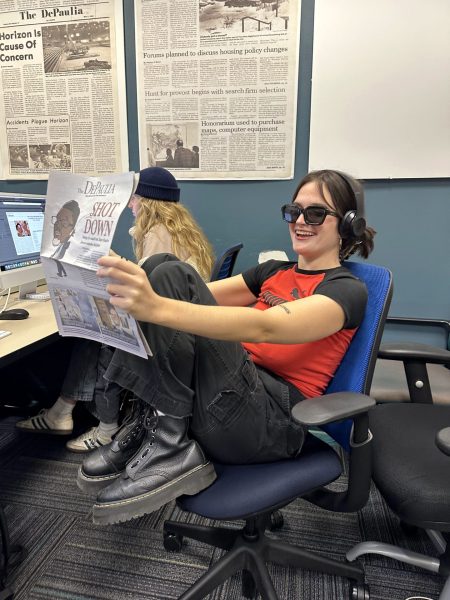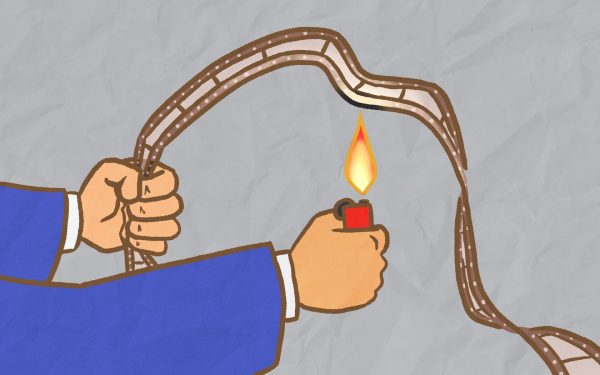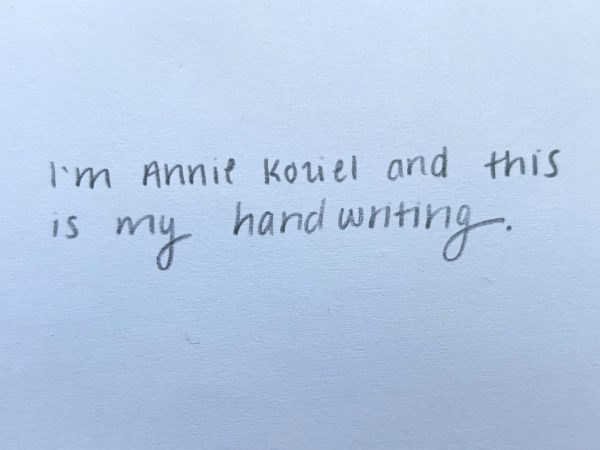Who sang it better?
Plagiarism in the music industry isn’t anything new, and it reflects the long-standing racial issues in pop culture
Annalisa Baranowski | The DePaulia for The DePaulia
Ariana Grande has two songs on Billboard’s Hot 100, is the second most streamed artist on Spotify and was Billboard’s 2018 Woman of the Year — she is one of the most popular female singers right now. With that comes a lot of media attention and, arguably, a lot of responsibility. Over a week ago now it spread across the internet that the chorus of her new single “7 Rings” was ripped from New York rapper Princess Nokia’s song, “Mine,” specifically its bridge. Although ripping from other artists is nothing new, this example sheds light on the microcosm of the history of pop music and what makes up the genre, as well as its blurred lines of cultural appropriation.
“Historically, appropriation has been central to how mainstream music is made,” said Daniel Makagon, DePaul professor and expert in the music industry, both independent and mainstream. “Almost across the boards, with some alternatives, what we would consider cool or hip music genres often start with black music.”
Princess Nokia is of Puerto Rican descent and is half black. Her song, “Mine,” is from her EP “1992.”
“Ain’t that the little song I made about brown women and their hair?” Nokia said in a recent Instagram video. She played Grande’s chorus and her bridge back to back. Grande uses eerily similar lyrics and production. Nokia uses beats made by local musicians, whereas Grande has a huge production team.
Nokia’s song says, “It’s mine, I bought it, It’s mine, I bought it.”
Grande song says, “You like my hair? Gee thanks, just bought it.”
Nokia’s song praises different black and brown hairstyles, from “Dominicans who rock they weaves innocent” to “Africans who braid, many hours spent.” The intro and outro of the song are also Nokia impersonating a white girl who is trying to touch her hair without consent. “Is that your real hair? No, you can’t touch my hair! You ain’t got no manners!” She ends the song by saying it is their personal choice how they wear their hair, and is not up to other people to ask about it.
Hair is a part of culture, as is music. When Grande takes from Nokia’s song about hair, it is invalidating the struggles these black and brown women have to go through. Is this Grande’s intentions? Probably not. But is it her responsibility to own up to and give credit to the original artist? Absolutely.
Nokia isn’t be the only one seeking some recognition for Grande’s song. After Soulja Boy’s proclamation of his influence on pop culture in his January Breakfast Club interview, many have drawn comparisons between “7 Rings” and his 2010 hit “Pretty Boy Swag.” Grande’s potential reparation came this past Friday with the release of the “7 Rings” remix with rapper 2 Chainz. Complications arise with this release — does this remix remedy her rip-off of a black musician’s song because it includes a black musician? It actually makes it much worse.

Also there is a difference between inspiration and theft, or lifting of music. To lift is to take without credit. “It can be hard to prove in court that music was stolen, unless it’s blatantly lifted” said Christopher Lemons, professor in the music department.
For skeptics and die-hard Grande fans, the question arises—will there ever be a time when originality is over? Has every melody already been made?
“We have a limited pitch, chords and rhythms,” Lemons said. “But it is all about creative intent.”
Grande is not the first pop star to appropriate from black culture. Her last few singles stray from her original sound, and take influence from hip-hop beats. She’s come under high scrutiny for not only co-opting black culture but using black face by tanning her skin and wearing hair extensions. It doesn’t end with Grande: We saw Taylor Swift’s most recent album, “Reputation,” where the cover art has graffiti styled writing and attempts to rap in some songs. Katy Perry is notorious for appropriation, like her 2013 American Music Awards performance, which was a Japanese geisha-themed performance.
Because Ariana Grande originally started out as a Nickelodeon star, Makagon argues that her music is not the most authentic. Typically, mainstream artists will go to an authentic source for creativity. What comes of it, is a more watered down version that is played on the radio. At first, this seems completely negative until Makagon explained the positive that can come from it.
“The mainstreaming of the ideas can have a ripple effect,” Makagon said. “An example is [the radio station] Hip-Hop Nation. Something about hip-hop culture spread beyond African Americans and to other communities and other races, globally.” Makagon argues that the mainstream versions allowed for a wider audience to become aware of social justice issues, and ultimately had a political effect.
Of course, the negative that comes from it is that these unauthentic artists and their corporate labels are taking money away from the authentic, often minority, community in which that type of music is originally made.
“The original community is the starting points of the cycle, and at the end of the road comes cultural appropriation,” Makagon said. “It will be at the top of stream by another artist.”
A majority of people either are unaware or disinterested on how mainstream music comes to be. This cycle will keep on happening as it has since the creation of pop music. This is not an excuse for it, though. The best way to appreciate music and support minority communities where the authentic music comes from is to attend DIY or local concerts.
Nokia has a fierce cult following that keeps growing, and Grande will likely continue on her path to pop music domination. We should use this example as a chance to further understand how mainstream music uses DIY and underground music for inspiration or appropriation. We should also take the opportunity to attend more DIY shows. Listening to mainstream music does not mean you agree with cultural appropriation and the lifting of music. Awakening yourself to the origins of the music and the real culture behind it is best for everyone.







